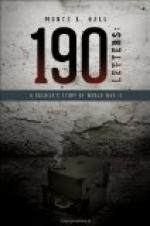But here, in battle, face to face with the eternities,
that spirit of his sounds like the chord of an instrument
heard for the first time in its originality and its
infinite sensibility. Nor are these random notes;
they soon make one harmonious sound and acquire a
most touching significance, until by daily practice
he learns how to abstract himself altogether from
the most wretched surroundings. A quite impersonal
ego seems then to detach itself from the particular
ego that suffers and is in peril; it looks
impartially upon all things, and sees its other self
as a passing wave in the tide that a mysterious Intelligence
controls. Strange faculty of double existence
and of vision! He possesses it in the midst of
the very battle in which his active valour gained
him the congratulations of his commanding officer.
In the furnace in which his flesh may be consumed he
looks about him, and next morning he writes, ‘Well,
it was interesting.’ And he adds, ’what
I had kept about me of my own individuality was a certain
visual perceptiveness that caused me to register the
setting of things—a setting that dramatised
itself as artistically as in any stage-management.
During all these minutes I never relaxed in my resolve
to see
how it was.’ He then, too,
became aware of the meaning of violence. His
tender and meditative nature had always held it in
horror. And, perhaps for that very reason, he
sought its explanation. It is by violence that
an imperfect and provisional state of things is shattered,
and what was lax is put into action again. Life
is resumed, and a better order becomes possible.
Here again we find his acceptance, his submission
to the Reason that directs the universe; confidence
in what
takes place—that is his
conclusion.
Such times for him are times of observation properly
so called, of purer thought in which the impulses
of the painter and the poet have no share. That
kind of observation is not infrequent with him, when
he is dealing with the world and with human action.
It awakes at a war-spectacle, at a trait of manners,
at the reading of a book, at a recollection of history
or art; it is often to the Bible that he turns, and,
amid the worst clamours, to the beautiful plastic
images of Greece. Admirable is such serene energy
of a spirit able to live purely as a spirit. It
is admirable, but it is not unique; great intellectual
activity is not uncommon with the French; others of
our soldiers are philosophers among the shells.
What does set these letters in a place apart is something
more profound and more organic than thought, and that
is sentiment; sentiment in its infinite and indefinite
degrees, its relation to the aspects of nature—in
a word, that poetic faculty which is akin to the musical,
proceeding as they both do from the primitive ground-work
of our being, and uniting in the inflexions of rhythm
and of song. I have already named Shelley in
connexion with the poet we are considering. And




